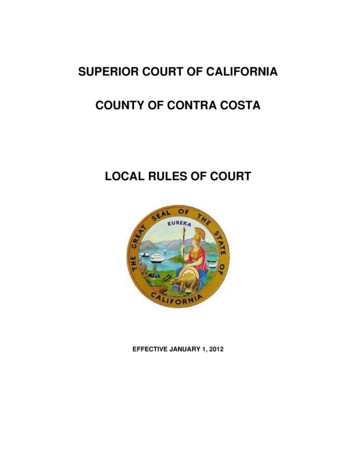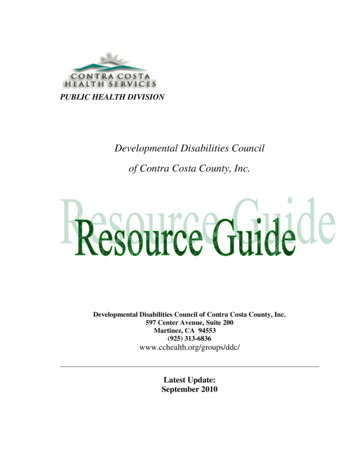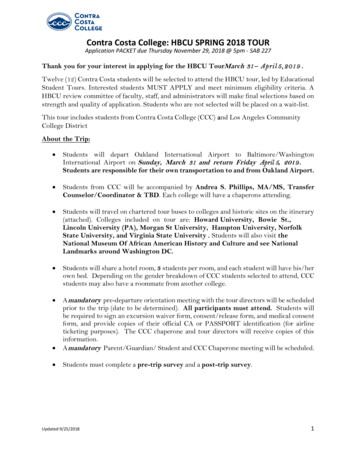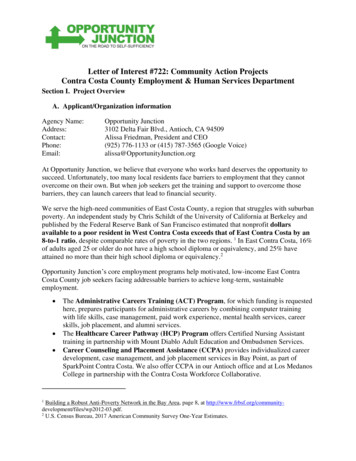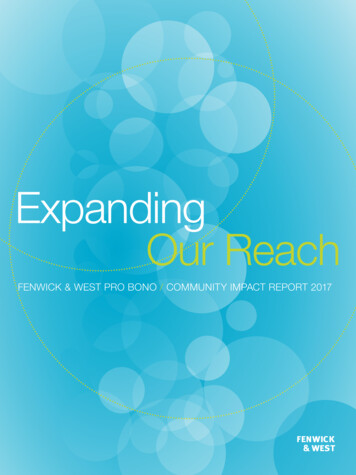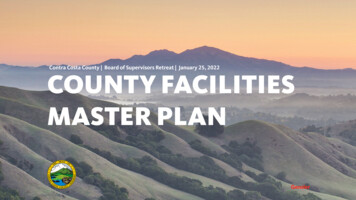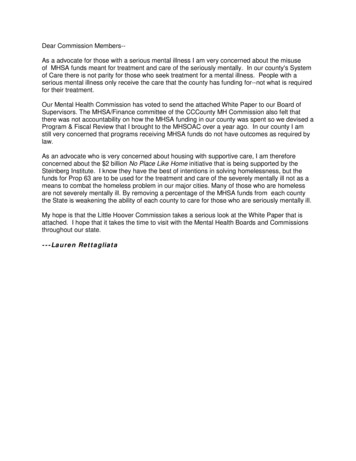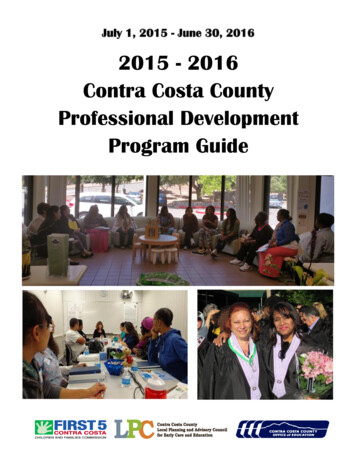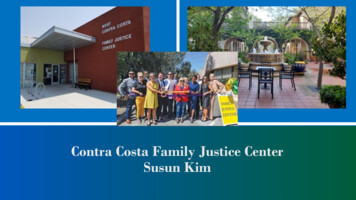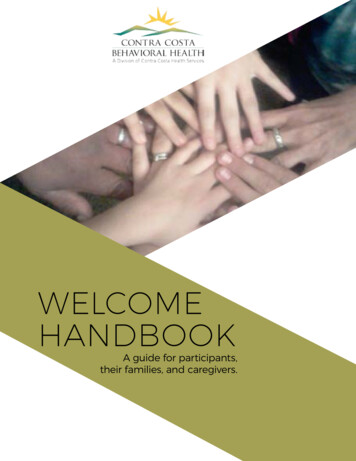
Transcription
WELCOMEHANDBOOKA guide for participants,their families, and caregivers.
CONTENTS03Welcome Letter04Emergencies06How to Access Services09Mental Health Services forAdults, Families & Caregivers10Mental Health Services forChildren & Their Families11Substance Use Disorders Services12 Office for ConsumerEmpowerment Services13What to Expect14Participant Rights15Take Charge of Your HealthArt in this handbook was contributed by mental health program participants through the PhotoVoiceEmpowerment Project, coordinated by the Office for Consumer Empowerment and the Committee forSocial Inclusion, and funded by the Mental Health Services Act.02Welcome Handbook Behavioral Health Services
Welcome toContra CostaBehavioral Health ServicesThe information in this handbook will help you and the people in yoursupport system, such as your family and friends, to find the services thatbest meet your needs.We focus on the whole person, meaning our programs and strategies helpwith all of the issues affecting your health, not just the one that promptedyour visit.Also, no matter how you were referred or where you receive care, every dooris the right door—you can access all of our services through that point ofcontact with our behavioral healthcare system.Through us, you can connect with resources such as mental health andsubstance abuse treatment, help with benefits and even referrals to helpyou find employment or housing.We and our community partners strive to provide:Hope for individuals to become their unique and best selves.Recovery that empowers individuals to manage their symptoms andreclaim meaningful lives and relationships.Partnership in bringing participants, family, friends, and professionalstogether in the hope-filled journey of recovery. Behavioral Health provides accessible and compassionate services forpeople of all ages and backgrounds in Contra Costa County.We are here to help. To learn more about us, visit cchealth.org/bhs.Cynthia Belon, LCSWDirector of Behavioral Health ServicesWelcome Handbook Behavioral Health Services03
EMERGENCIESIf there is alife-threateningemergency call 911.If someone is experiencing a mental or emotional crisis and needs help right away, go to Psychiatric EmergencyServices (PES) at Contra Costa Regional Medical Center, 2500 Alhambra Avenue in Martinez. The PES 24-hour lineis 925-646-2800.For questions and non-emergency services, call the Behavioral Health Access Line at 1-888-678-7277.URGENT CAREIf someone needs non-emergency urgent care for a behavioral health concern, call 925-313-7940 or visitthe Miller Wellness Center at 25 Allen Street in Martinez. Help is available from noon to 8:15 p.m. weekdays andfrom 8 a.m. to 4:15 p.m. Saturdays.WHAT IS 5150?“5150” refers to Section 5150 of the California Welfare & Institutions Code. When an individual is a danger to selfor others, or is lacking the ability to meet basic needs (such as food, clothing, or shelter) because of a mental oremotional problem, this is the criteria for a 5150 legal hold to place someone at a locked, inpatient facility fortheir own safety during a mental health emergency.If you or your family member is experiencing this and is not willing or able to come to PES voluntarily, call 911.Officers will respond and assess the situation. If officers agree that the 5150 criteria are met, they will arrange totake the person to Contra Costa Regional Medical Center in Martinez. PES staff can hold a person for up to72 hours for assessment, evaluation, and crisis intervention.Family members and caregivers of people on 5150 holds can provide information to staff,but state privacy laws prohibit PES from sharing a patient’s medical informationwithout their permission.“”Most people assume that the path for aperson with mental illness is dark and hopeless.With help, guidance, and insight, it is possible toreach the light of recovery and wellness.—PhotoVoice Participant (Class of 2012)04Welcome Handbook Behavioral Health Services
PATIENT PARKING BUS STOP STAIRSPATIENT &VISITORPARKINGENTPA LOT APATIPATIENT PARKINGLABRKINGPATIENT PARKINGPATIENT PARKINGLOT FPHYSICAL NTRANCE3rd Floor 3rd FloorMATERIALSMANAGEMENT2nd FloorELEVATORE BLDG.1st FloorSTOREROOM2nd FloorLOADINGDOCKAMARTINEZ HEALTH CENTERTGIF POSHGEORGE &CYNTHIA MILLERWELLNESSCENTERTR L1A / L2ILERDISABLED PARKINGEMPLOYEEPARKINGLOT EPATIENTDROP-OFF& PICK-UPBLDG. 1NORTHPATIENT &VISITOR PARKINGLOT DLOT BEMPLOYEE PARKINGLOT HOUTPATIENT CLINICSCANCER CENTERCARDIOPULMONARYMEDICALSOCIALSERVICESBUS BUS TEAMSTERBUILDING Psychiatric Emergency Services Inpatient Psychiatric Services Miller Wellness CenterWelcome Handbook Behavioral Health Services05
HOW TO ACCESS SERVICESThe 24-hour Behavioral Health Access Line is an easy-to-use resource for mental health and substance useservices. Call toll-free 1-888-678-7277 for:Questions about mental health services and supportive recovery resources for substance use disorders.Assistance finding services.Insurance questions and referrals to low-cost and sliding scale services if uninsured. Be prepared to answer questions on your needs and provide your Medi-Cal or other insurance information.Language interpretation services are available. Call during business hours (8 a.m. to 5 p.m.) weekdays forquickest service.Other 24-hour linesCrisis and Suicide Hotline. 1-800-833-2900211.org. 211Free national hotline for referrals to social servicesPsychiatric Urgent & Emergency CareGeorge & Cynthia Miller Wellness Center—Behavioral Health25 Allen St., Martinez, CA 94553925-313-7940Short-notice/same-day behavioral health appointmentsPsychiatric Emergency Services2500 Alhambra Ave, Martinez, CA 94553925-646-2800“”This is a picture of how my life is,growing up scrambled branchesgoing each every way. The middle isdark and edges are light. I keep myeyes on the light.This picture represents my life;two strong branches in the bottom aremy parents who were separated whenI was a little girl. My mother who wasthe strongest, my dad I never knew.Life has been a struggle, but I see thelight above and I will survive all thestruggles ahead of me.I am a strong woman!06— PhotoVoice Participant(Classof 2016)Welcome Handbook BehavioralHealthServices
CONTRA COSTA COUNTY MENTAL HEALTH CLINICSEast County Adult Mental Health Services2311 Loveridge Rd., 2nd FloorPittsburg, CA 94565925-431-2600Central County Children’s Mental Health2425 Bisso Lane #200Concord, CA 94520925-646-5468East County Children’s Behavioral Health2335 Country Hills Dr.Antioch, CA 94509925-608-8700First Hope1043 Oak Grove RoadConcord, CA 94518925-681-4450Early identification and intervention to preventpsychosisWest County Adult Mental Health Services2523 El Portal Dr. #103San Pablo, CA 94806510-215-3700West County Children’s Mental Health Services303 41st St.Richmond, CA 94805510-374-3261Older Adult Mental Health2425 Bisso Lane #100Concord, CA 94520925-521-5620Central County Adult Mental Health Services1420 Willow Pass Rd. #200Concord, CA 94520925-646-5480Welcome Handbook Behavioral Health Services07
Mental Health Family Services CoordinatorsThe Adult and Children Family Services Coordinators are the family voice in Behavioral Health Administration andprovide supervision and training for the Adult Family Support Workers and Children’s Family Partners in the clinics.Adult.925-957-5139Children. 925-521-5722OTHER COUNTY PROGRAMS AND DEPARTMENTSAssisted Outpatient Treatment (Laura’s Law).844-422-2268Behavioral Health Services & Mental Health Administration1340 Arnold Dr. #200, Martinez, CA 94553.925-957-5150Conservatorship. 925-335-3900Employment & Human Services Department (Medi-Cal; for moreinformation on Medi-Cal visit www.dhcs.ca.gov).1-866-663-3225Health, Housing and Homeless Services .925-313-7700Mental Health Financial Counseling Department. 925-372-4444Office for Consumer Empowerment.925-957-5105See pg. 14 for a description of servicesOffice of Patients’ Rights (provides grievance advocacy). 925-293-4942Office of Quality Improvement (handles grievances). 925-957-5160Primary Care Appointments for Contra Costa Regional Medical Center& Health Centers.1-800-495-8885or online at http://cchealth.org/mycclink/Vocational Services. 925-288-3950See your service provider for a referralMobile Response Teams. 1-877-411-1089Serves youth and families in serious distress 7 days per weekCOMMUNITY CONSUMER- AND FAMILY-CENTERED SUPPORTSNational Alliance on Mental Illness (NAMI) provides support, outreach,education, and advocacy to individuals living with and familiesaffected by mental illness (www.namicontracosta.org). 925-942-0767Putnam Clubhouse is a social and vocational rehabilitation work programfor people living with and in recovery from mental illness(www.putnamclubhouse.org)3024 Willow Pass Rd., Suite 230, Concord, CA 94519.925-691-4276RI International is a global organization that supports people to succeedin the community where they live, work, and play (www.riinternational.com)3711 Lone Tree Way, Antioch, CA 94509.925-732-79302975 Treat Blvd. #C–8, Concord, CA 94518.925-363-72902101 Vale Rd. #300, San Pablo, CA 94806.510-236-3020To learn more about services and programs in your area, ask treatment staff for a regional service directory.08Welcome Handbook Behavioral Health Services
MENTAL HEALTH SERVICES FOR ADULTS &THEIR FAMILIES/CAREGIVERSMental Health Services operates three regional adult mental health clinics and one older adult mental healthclinic, and supports additional services throughout Contra Costa.Clinic ServicesPsychiatric and medication assessments, consultation, and medication management.Individual, family, and group outpatient therapy.Case management to coordinate services.Community Support Workers (peer providers), professionals with experience as a mental healthparticipant, help navigate our services and resources.Family Support Workers with experience caring for loved ones with serious mental illness, available toinform and support family members of participants on services and information needed to provide bettercare to their loved ones.Wellness and prevention planning using the evidence-based Wellness Recovery Action Plan .(WRAP)process.Assistance planning and managing financial benefits and resources.Crisis intervention, including psychiatric diagnostic assessment, medication, emergency treatment,screening for hospitalization and intake, discharge planning and placement, and referral services. Other ServicesCrisis, transitional, and supervised residential care.First Hope, a prevention program that provides diagnostic and treatment services for adolescents andyoung adults who are at risk for psychosis.Community reintegration services for those with co-occurring mental health and substance relateddisorders who are transitioning from the justice system.Full Service Partnership (FSP) for participants who may need 24-hour services, including crisis interventionand stabilization, treatment, peer support, and family education services .Short-term case management transition services for participants with severe and persistent mental illness,in order to engage them in mental health services and move into the appropriate environment.Vocational services including job search preparation, referrals, coaching, and benefits management.Assisted outpatient treatment for those with severe mental illness who may be a danger to themselves orothers, and will not participate in treatment.Evidence-based practices based on need. Services for Older AdultsIntensive Care Management (ICM) to support aging in place.Improving Mood Providing Access to Collaborative Treatment (IMPACT) for those experiencing depressionwhile receiving medical care.Senior peer counseling. Welcome Handbook Behavioral Health Services09
MENTAL HEALTH SERVICES FOR CHILDREN &THEIR FAMILIESChildren’s Mental Health Services operates three regional clinics as well as offers home, school, andcommunity-based services to meet the varied needs of children, youth and their families.Clinic ServicesPsychiatric and medication assessments, consultation, and medication managementIndividual, family, and group outpatient therapyCase management to coordinate servicesFamily Partners, with lived experience caring for family members with serious mental illness, supportfamilies of participants and help them navigate services and resourcesWraparound services for children with serious emotional disturbances that involves each family’s socialnetworkEvidence-based practices, which are practices that have research showing they are effective treatments;practices include: Therapy for depression and anxiety. Therapy for self-harmful behaviors. Therapy for post-traumatic stress disorder and difficulties related to traumatic life events. Positive Parenting Program (Triple P) to increase parents’ confidence in their parenting abilities. Family-based treatment of eating disorders. Other ServicesPsychological evaluations to aid with placement planning and treatment of children in the child welfaresystem who have been removed from the home due to abuse or neglect.First Hope, a prevention program that provides diagnostic and treatment services for adolescents andyoung adults who are at risk for psychosis.Full Service Partnership (FSP) for participants who may need 24-hour services, including crisis interventionand stabilization, treatment, family support, and family education services .Intensive Home-Based Services (IHBS) provides intervention in the home and school for foster childrenand youth at risk of foster care placement.Mobile Response Team (MRT) travels to participants who are 18 and younger to provide immediate crisisintervention.Multi-Dimensional Family Therapy (MDFT) is family-based treatment for substance-abusing adolescents, orthose with co-occurring substance use and mental disorders.Multi-Systemic Therapy (MST) is community-based, family-driven treatment for antisocial or delinquentbehavior in youth.Therapeutic Behavioral Services (TBS) for youth who are placed or being considered for placement in ahigh-level group home or locked treatment facilities for treatment. 10Welcome Handbook Behavioral Health Services
SUBSTANCE USE DISORDERS SERVICESAlcohol and Other Drug Services (AODS) provides a planned, comprehensive approach forproviding substance use disorder prevention and treatment services in Contra Costa County.Core ServicesDetoxification in a 24-hour, non-medical, monitored environment to ensure safe withdrawal from alcoholor drugs.24-hour residential programs featuring structured therapeutic activities, assessment, treatment plan development and monitoring. Counselors provide vocational counseling, job search, and employment referrals,along with support to prevent relapse and linkage to 12-Step based groups.Outpatient drug-free counseling for individuals, groups, and families, including education and relapseprevention services.Methadone maintenance and detoxification services for heroin, involving medically supervisedadministration of daily doses of methadone in conjunction with behavioral health counseling. AOD workswith the Choosing Change clinics to provide referrals, system navigation and behavioral health support topatients taking Suboxone for opioid dependence. Youth, Family, and Community ServicesFamily-centered, culturally competent, and youth-specific treatment in outpatient and residential settingsfor youth 13 to 18 years of age.Prevention services engage diverse communities and schools to reduce underage use and youth accessto alcohol and other drugs.Driving Under the Influence (DUI) programs are available for first-time and multiple offenders. “”This is a picture of a cargo ship at the Martinez.Marina. The cargo ship gets help from a teamof tugboats, getting in and out of port. Withoutthe tugboats help, the cargo ship can’t come toport. This picture represents the help I receive.My tugboat team includes my case manager, mydoctor, and my supportive programs such asSocial Inclusion and PhotoVoice. This picture is areminder of how sometimes you need a team tohelp you get where you need to be. And when yousee someone struggling, remind yourself they mayneed some help and support, just like a tugboat.—PhotoVoice Participant (Class of 2014)
OFFICE FOR CONSUMER EMPOWERMENTSERVICESThe Office for Consumer Empowerment (OCE) ensures that people with lived mental health experience have aleadership role in shaping clinical and wellness services in Contra Costa County.Through education and engagement, we empower consumers to advocate for consumer-driven, culturallyappropriate services.Our projects include:Service Provider Individualized Recovery Intensive Training (SPIRIT) is a peer-led, college-accreditedcourse for people with lived experience as consumers of mental health services or family members ofconsumers. Graduates may be considered for peer or family community support worker positions withContra Costa Behavioral Health Services and peer or family provider positions with community-basedorganizations. An employment skills and placement program is available for SPIRIT graduates.Coordinating the Wellness Recovery Action Plan (WRAP) program, including groups at the County clinicsand at some community-based organizations.Providing staff support for the Committee for Social Inclusion, a public Behavioral Health Servicesstakeholder committee meeting monthly that unites consumers, family members, and providers inworking to overcome stigma and discrimination in the community.Wellness and Recovery Education for Acceptance, Choice and Hope (WREACH) teaches participants andtheir families how to present their personal recovery and resilience stories to public audiences to reducestigma faced by people with behavioral health challenges.PhotoVoice, a program in which consumers create artwork with photos and their own words about theprejudice, discrimination and stigma faced by people with behavioral health challenges (examples seenthroughout this booklet). “”These colors come with Stigma & Ignorance fromSociety. They represent Life & Growth which I believewe should see in all people. A little COMPASSION canbe very POWERFUL! ORANGE is for Self-Harm, peoplesaw me as attention seeking. Now this color is forOptimism! YELLOW represents my struggle with suicide,people saw this as weakness. This color is for Hope!GREEN is for my fight with Mental Illness, being seenas “Crazy,” “Defiant,” and “Inadequate.” Now, this colorrepresents Growth & Healing! BLUE is for Child Abuse,with it came Guilt, Shame, & Trauma. Now, it representsPeace & Trust! PURPLE represents Domestic Violence,ADD, Fibromyalgia, and Homelessness. People treatedme like I was Worthless, Stupid, Lazy, and Diseased. Thiscolor now represents Creativity! RED represents my lifewhen I used Substances, people seeing this as beinga Drain on Society. Now it stands for Love! The WHITEflowers remind me that I am a SURVIVOR!—PhotoVoice Participant (Class of 2014)12Welcome Handbook Behavioral Health Services
WHAT TO EXPECTKnowing what to expect on the road to recovery can help provide peace of mind. While every situation isdifferent, here are some common steps in treatment.ASSESSMENTThe first clinic appointment will likely include an assessment. After filling out some paperwork, the participantwill meet with a clinician to talk about concerns, background, strengths, and goals.When the participant is open and candid, staff will be better able to connect them to appropriate services. Tellthe clinician about any medications and other healthcare the participant is already receiving.PLAN OF TREATMENTAfter the clinical assessment the next steps will likely include creating an individualized partnership ortreatment plan describing treatment. The participant will help develop this plan.The plan incorporates strengths, life goals, treatment goals, and strategies for increased wellness. It can includehelp such as community treatment or—with permission—friends and family.All of the services in the plan are designed to encourage wellness and recovery. It is important for participantsto stick with it and keep all appointments with the treatment team.During the recovery journey, participants will reach important milestones, but may also experience setbacks – itis common. The plan helps to stay on track, or to get back on track.RECOVERYAs there is progress in recovery, participants may transition to different services as needs change. This mayinclude programs, support resources, and groups to help avoid future problems, strengthening skills to managetheir own health, and encouraging participation in the community.Recovery is unique to each participant’s needs and goals. While levels and types of mental health andsubstance use disorders treatment for an individual may vary over time, we are here to help participantsachieve their wellness and succeed in their goals.Welcome Handbook Behavioral Health Services13
PARTICIPANT RIGHTSParticipants have the right:to be treated with dignity and respectto be free from abuse and neglectto participate in treatment, including development of the partnership or treatment plan anddischarge planto receive services appropriate to age, sex, gender identity or expression, language, culture, sexualorientation, and spiritual beliefsto make complaints without fear of a negative consequence INFORMED CONSENTThe provider will explain the participant’s treatment options, including the expected results, possible sideeffects and alternatives, so they can think about the best choice before agreeing to treatment. This is calledinformed consent.RECORDSThe participant (or his or her legal guardian) may access all records that Contra Costa Health Services keepsabout your healthcare. Record requests must be in writing. Talk to a provider for details.CONFIDENTIALITYWe will not share a participant’s medical records or other information about care with anyone, includingmembers of the participant’s family, without permission from the participant or his or her legal guardian.Only people involved in providing care can legally access health records without written permission, accordingto the federal Health Insurance Portability and Accountability Act (HIPAA) of 1996 and 42 Code of FederalRegulations Part 2 (42 CFR Part 2).During the intake appointment, the clinician will provide more details about privacy rights.“”This is a charming dog, waiting for someone toacknowledge her. Everyone likes to be acknowledgedonce in a while. It shows kindness and love for others.Reaching out to someone with a mental illnesswould be a good start for breaking the stigma thatkeeps people with mental health conditions frombeing recognized. It shows acknowledgement of theirpresence when you say a kind word or do a kind act.— PhotoVoice Participant(Class of 2012)
“”Can be a life’s journey toward wholeness and the authentic self.The journey toward the center can be one of countless twistsand turns. The center of the labyrinth is but the completion ofone journey. There are myriad journeys in life. Each with abeginning and an end. Sometimes the beginning and theend are the same. The completion resembles the start,such has been in my life. Sometimes two steps backand one step forward, going around in circles.Thus, the labyrinth can be as a metaphor for life.—PhotoVoice Participant (Class of 2015)PARTICIPANTS: TAKECHARGE OF YOUR HEALTHTo make the most of your treatment: Be on time. If you can’t make an appointment, call at least 24 hours in advance tocancel or reschedule.Follow the rules of your programWork with us to build a partnership or treatment plan that suits your needs and fits your life.Respect the privacy of others.Talk to us. Tell us about your needs, preferences and goals, and let us know about your progressor any challenges in meeting your goals.Tell your provider if you experience severe changes in your mood, thoughts, or behavior.Tell us about changes in your health, symptoms, lifestyle, or medication, including if youneed refills.Let staff know about any changes in your name, insurance, or contact informationTreat your providers and other participants with respect.Ask questions.Try to exercise regularly, eat well, and take good care of yourself. Ask your provider ifyou need help.Welcome Handbook Behavioral Health Services15
“”I am beautiful, a part of the whole. If part of the landscape dies itis removed and may be replaced. I am still alive and as a part of thislandscape I need nurturing and care. Thanks for the nurturing andcare. You are part of this landscape too.—PhotoVoice Participant (Class of 2016)
Services (PES) at Contra Costa Regional Medical Center, 2500 Alhambra Avenue in Martinez. The PES 24-hour line is 925-646-2800. For questions and non-emergency services, call the Behavioral Health Access Line at 1-888-678-7277. . for people living with and in recovery from mental illness (www.putnamclubhouse.org) 3024 Willow Pass Rd., Suite .
